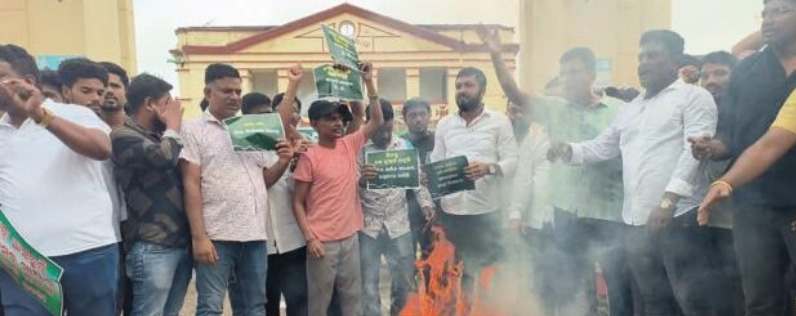Bhubaneswar: Student politics across Odisha is currently in a state of intense agitation, fueled by the tragic self-immolation of Soumyashree Bisi, a student of Fakir Mohan Self-Governing College, Balasore, and the subsequent legal and political developments.
The incident has not only sparked widespread protests from Balasor to Sambalpur and Malkangiri to Mayurbhanj but has also cast a long shadow over the long-awaited student union elections in colleges, raising serious questions about campus safety and governance.
The tragic death of Soumyashree, who succumbed to her injuries after setting herself ablaze following alleged sexual harassment and inaction by college authorities, has ignited a fierce debate. Initially, the FM College Principal and a professor were arrested and suspended in connection with the Balasore incident. The investigation further led to the arrest of an old student of the Odisha Government’s Crime Branch College and another student who was injured while attempting to rescue Soumyashree. Both Soumyashree and the two arrested students are identified as activists and members of the Akhil Bharatiya Vidyarthi Parishad (ABVP).
This connection has given a significant political twist to the unfolding drama. Given the ABVP’s known affiliation with the Governing Bharatiya Janata Party (BJP), which is currently in power both at the Centre and in the state, the arrest and imprisonment of two ABVP student leaders by the Odisha government has become a contentious issue. Opposition parties, including the Students Congress and Biju Chhatra Janata Dal, have seized upon this, actively campaigning across various colleges and university campuses, accusing the ruling party of political vendetta and mismanagement. Conversely, the BJP and ABVP have repeatedly alleged that opposition parties are engaging in “dirty politics” over the sensitive Soumyashree case.
The volatile atmosphere has already manifested in violence, with a student of Swami Vivekananda College in Jagatsinghpur reportedly suffering a fatal attack in the context of the upcoming Students’ Union elections, highlighting the intensity of community support and political rivalry. The fact that local MPs and MLAs in both Jagatsinghpur and Balasore are from the BJP has further fueled public discussion regarding the effectiveness of governance and law enforcement in maintaining campus peace.
A critical question looming over the state’s educational landscape is whether the student union elections, postponed time and again for many years, will finally take place this academic year ? For nearly a decade, college students have not witnessed a college election, leading to a disconnect between student bodies and campus realities. Despite the Higher Education Minister’s announcement last year, soon after coming to power, that elections would be held, they did not materialize. The current climate of violence, hatred, and enmity among college students casts serious doubt on the possibility of a peaceful and smooth electoral process.
Adding to the complexity are the systemic deficiencies within the higher education system. Most government and aided colleges lack regular Principal and are heavily reliant on guest lecturers, impacting academic stability. Similarly, 13 universities are operating without regular vice-chancellors, and over 50 percent of regular teaching posts remain vacant. These significant administrative and academic gaps raise fundamental questions about who will effectively conduct the student’s Union elections and manage the potentially volatile situation before and after them, further deepening the uncertainty surrounding the future of student democracy in Odisha.


